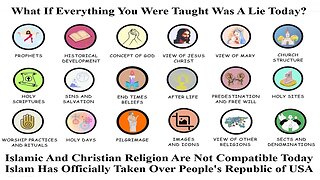Premium Only Content

This Is Only A Test From God To All Of Man Kind & Why God Cannot Kill Satan Or Fallen Angels
So This Is Only A Test From God To All Of Man Kind And This Is Why God Cannot Kill Satan Or The Fallen Angels! Why hasn’t God destroyed Satan? The Bible reveals profound truths about God’s eternal plan, justice, and love. Today we explore the Biblical truth behind why Satan still exists, the rebellion in heaven, and the spiritual battle that continues to shape our world. Discover how God’s patience, sovereignty, and justice manifest in ways beyond human understanding.
From Lucifer’s creation as the morning star to his tragic fall, this video uncovers the complete history of Satan and the fallen angels. Learn how free will, divine love, and ultimate redemption are central to God’s plan, even amidst the presence of evil. We delve into the roles of the Holy Spirit, Michael the archangel, and the faithful angels who stand firm against darkness.
God’s victory is already written, and this incredible history of Christianity reminds us that no power compares to His authority. Satan’s existence is not a sign of weakness but a testament to God’s purpose, demonstrating how even the enemy’s schemes are woven into His divine design.
If God is all-powerful and just, why hasn’t He destroyed Satan and the fallen angels? This question has echoed through the minds of believers for centuries, stirring deep reflection and curiosity. After all, if Satan is the root of so much pain, temptation, and evil in the world, wouldn’t it make sense for God to simply end his existence?
The truth is, God’s decision to allow Satan and his followers to continue their influence is not a sign of weakness. Prepare to discover how, even in the presence of evil, God’s power reigns supreme—and why, in the end, His justice will be complete and undeniable.
Here are the 7 reasons why God cannot kill Satan or the Fallen angels:
1. To Fulfill God’s Sovereign Plan
God is the ultimate ruler of everything nothing happens without His knowledge or permission. This is what we mean when we talk about God’s sovereignty. The Bible tells us in Isaiah 46:10 that God declares “the end from the beginning.” This means that every event, even those we don’t understand, fits into His greater plan. Now, you might wonder: Why would a good God allow Satan to still exist? The answer lies in the fact that even Satan’s rebellion can be used to fulfill God’s bigger, mysterious purpose.
Satan’s presence allows God’s plan of redemption to unfold. From the moment Adam and Eve fell into sin because of Satan’s deception (Genesis 3:1-6), God already had a rescue plan in place. This is why Jesus is called “the Lamb who was slain from the foundation of the world” (Revelation 13:8). If Satan didn’t exist, there would be no need for redemption, no need for Jesus’ sacrifice, and humanity might never fully understand the depth of God’s love and mercy.
By allowing Satan to remain active, God demonstrates His ability to turn evil into something that ultimately brings good. Think of Joseph’s story in Genesis 50:20, where Joseph tells his brothers, “You meant evil against me, but God meant it for good.” Just like in Joseph’s story, Satan’s actions can never overpower God’s plan. Every scheme of the enemy ends up highlighting God’s power and wisdom even more.
Another reason God allows Satan to remain is to reveal His justice and patience over time. Instead of immediately destroying Satan after his rebellion, God allows history to unfold in a way that shows His fairness. This way, no one can ever accuse God of being unjust. Every being humans, angels, and even Satan himself will see that God’s decisions are righteous and fair (Revelation 15:3).
God also uses Satan’s ongoing presence to showcase His ultimate victory. The story of humanity isn’t just about avoiding evil but about witnessing God’s triumph over it. When Jesus died on the cross and rose again, He didn’t just save humanity. He defeated Satan’s power (Colossians 2:15). Yet, God allows Satan some time to continue his work, so when final judgment comes, there will be no doubt that God’s power is absolute and unstoppable.
In the end, Satan’s survival serves a purpose within God’s grand design—a story of justice, mercy, love, and victory. Every challenge, every trial, and every temptation faced by believers becomes an opportunity to witness God’s faithfulness. This is why, even though Satan still exists for now, his defeat is already sealed, and God’s sovereign plan will be fully revealed for all creation to see (Revelation 20:10).
2. To Test and Refine Humanity
Now that we understand how Satan’s existence fits into God’s greater plan, another important reason God allows Satan to remain is to test and refine humanity. While it might seem harsh at first, testing is not meant to destroy us it’s meant to strengthen us and reveal the depth of our faith. Just as gold is purified through fire, believers are refined through trials (1 Peter 1:6-7). God allows Satan to challenge people, but only within limits that God Himself sets.
One of the clearest examples of this is found in the story of Job. In Job 1:6-12, Satan appears before God, claiming that Job is only faithful because of his blessings. God allows Satan to test Job but sets clear boundaries Satan cannot take Job’s life. Through immense suffering, Job’s faith is tested. Although Job struggles with deep pain and loss, his endurance becomes a powerful testimony of unwavering faith. In the end, Job’s trials not only strengthen his faith but also reveal God’s justice and compassion.
These tests serve a larger purpose: they expose what is truly in our hearts. Satan’s temptations highlight human weaknesses, but they also offer opportunities for growth. When Jesus was tempted by Satan in the wilderness (Matthew 4:1-11), His victory over temptation set an example for all believers. It showed that, with God’s Word and faith, we can overcome any challenge thrown at us. These moments of testing help believers develop spiritual strength and perseverance.
Furthermore, testing brings believers closer to God. In difficult times, people often pray more, seek God’s guidance, and lean on His promises. James 1:2-4 encourages believers to “consider it pure joy… whenever you face trials of many kinds, because you know that the testing of your faith produces perseverance.” Satan’s tests, therefore, become tools that drive believers deeper into their relationship with God.
It’s also important to remember that God never allows Satan to test us beyond what we can bear. 1 Corinthians 10:13 reminds us that “God is faithful; He will not let you be tempted beyond what you can bear.” This assurance reveals God’s protective hand, even in moments of hardship. The tests are not designed to break us but to help us rely on God’s strength and grow in spiritual maturity.
Ultimately, while Satan’s tests can be painful and difficult, they serve a purpose in God’s divine plan. Each trial is an opportunity to grow stronger, draw nearer to God, and prove that faith can triumph over any darkness. These tests refine our character, deepen our trust in God, and prepare us for the eternal rewards He has promised.
3. To Display God’s Justice in Time
After understanding how trials refine and strengthen believers, it’s natural to wonder why God doesn’t simply judge Satan immediately. If his existence leads to suffering and temptation, why allow him to continue? The answer lies in God’s commitment to displaying perfect justice—not rushed, not impulsive, but fair and clear to all creation. God allows time to pass so that His justice will be fully revealed and understood by everyone.
In 2 Peter 3:9, the Bible reminds us that “the Lord is not slow in keeping His promise… Instead He is patient with you, not wanting anyone to perish, but everyone to come to repentance.” This patience isn’t weakness—it’s mercy. God delays Satan’s final judgment to give humanity time to recognize His goodness and turn away from sin. If judgment came instantly, many would never have the chance to experience God’s grace or understand the depth of His love.
Satan’s ongoing presence also serves to demonstrate the consequences of rebellion. When Satan fell from heaven (Isaiah 14:12-15; Ezekiel 28:12-17), it wasn’t just an act of disobedience it was a challenge to God’s authority. Instead of ending Satan immediately, God allows his actions to continue as evidence of what happens when creation turns away from its Creator. This becomes a living lesson, not only for humanity but also for angels and all spiritual beings, showing that rebellion leads to destruction and suffering.
God’s timing also ensures that no one can question His fairness when judgment finally comes. By allowing Satan’s influence to continue for a time, God demonstrates that His justice is patient and deliberate. When Satan is ultimately cast into the lake of fire (Revelation 20:10), it will be clear that every opportunity for repentance and redemption was given, and God’s final judgment will be seen as fully justified by all.
This period of waiting also allows God’s mercy and justice to work side by side. Every moment that Satan continues to exist is also a moment of opportunity for humanity to turn back to God. God’s justice isn’t about quick punishment it’s about giving every soul a chance to choose between good and evil. This balance between justice and mercy highlights God’s character as both loving and righteous (Psalm 89:14).
In the end, God’s justice will be complete, leaving no room for doubt. Satan’s current existence is not a sign of weakness on God’s part but a demonstration of His patience, fairness, and desire for all to see the full truth of His justice. When judgment comes, it will be final, deserved, and clear to every being in heaven and on earth.
4. To Highlight the Reality of Free Will
As we reflect on God’s justice and patience, another profound reason emerges: free will. God allows Satan to exist to highlight the reality of choice. He didn’t create humanity to be robots forced to love and obey Him. Instead, God offers every person the freedom to choose between good and evil, right and wrong. Without the presence of temptation, genuine free will wouldn’t truly exist.
When God created Adam and Eve, He placed them in the Garden of Eden with the freedom to choose. The presence of the tree of the knowledge of good and evil (Genesis 2:16-17) and Satan’s temptation (Genesis 3:1-6) gave humanity the opportunity to make a real choice. Sadly, they chose disobedience, but this act revealed the importance of free will—true love and faith can only exist when there’s freedom to choose otherwise.
Satan’s ongoing influence continually presents humanity with choices that test their loyalty and love for God. Every temptation becomes an opportunity to either draw closer to God or drift away. This is why Deuteronomy 30:19 says, “I have set before you life and death, blessings and curses. Now choose life, so that you and your children may live.” Without Satan’s presence, these meaningful choices wouldn’t exist, and the depth of human faith and devotion would never truly be revealed.
Jesus Himself faced temptation to show how free will operates even under pressure. In Matthew 4:1-11, Satan tempted Jesus three times, offering Him power and glory if He would abandon God’s will. But Jesus chose obedience, using Scripture to resist every temptation. This moment powerfully demonstrates that even in the face of evil, believers have the power to choose God and walk in righteousness.
Free will also reveals the true nature of human hearts. God doesn’t force anyone to follow Him; instead, He invites us to make that decision willingly. Joshua 24:15 famously challenges the people of Israel, saying, “Choose for yourselves this day whom you will serve.” The presence of Satan allows those choices to be real and meaningful, making acts of faith and devotion genuine rather than forced.
In allowing Satan to exist, God respects the freedom He has given humanity. Every choice made—whether for good or evil shapes a person’s character and relationship with God. While Satan’s influence presents challenges, it also allows believers to demonstrate true love, loyalty, and faith through their decisions. Ultimately, this freedom of choice reflects the heart of God’s relationship with humanity: a love that is freely given and freely received.
5. To Reveal God’s Power Over Evil
Understanding the role of free will naturally leads us to another crucial reason why God allows Satan to exist: to reveal His power over evil. While Satan is allowed to operate for a time, he is never beyond God’s control. Every attempt Satan makes to oppose God ends up showcasing God’s unmatched authority and strength. Rather than diminishing God’s glory, Satan’s schemes ultimately highlight God’s power and victory.
One of the most powerful examples of this is seen in the life and ministry of Jesus Christ. When Jesus was tempted in the wilderness (Matthew 4:1-11), Satan tried to lure Him with promises of power, safety, and wealth. Yet Jesus overcame every temptation by standing firm on God’s Word. This wasn’t just a personal victory for Jesus it was a clear demonstration that God’s truth is stronger than any lie Satan can offer.
But the greatest display of God’s power over Satan came through Jesus’ death and resurrection. On the surface, the crucifixion seemed like a victory for Satan—God’s Son was betrayed, beaten, and killed. Yet what appeared to be defeat became the greatest triumph in history. Colossians 2:15 explains that through the cross, God “disarmed the powers and authorities” and “made a public spectacle of them, triumphing over them.” Jesus’ resurrection shattered Satan’s grip on sin and death, proving that no power of darkness could stand against God’s plan.
Even now, Satan’s influence is limited by God’s authority. In the Book of Job (Job 1:12), Satan needed God’s permission to test Job, proving that Satan cannot act without God’s allowance. This shows that God remains fully in control, using even Satan’s schemes to fulfill His greater purpose. What Satan intends for harm, God transforms into opportunities for growth, faith, and victory.
This ongoing struggle between good and evil also strengthens believers’ faith. Every victory over temptation is a personal reminder of God’s power working through them. James 4:7 encourages believers to “resist the devil, and he will flee from you.” This promise shows that through God’s strength, every believer can overcome Satan’s attacks and walk in victory.
In the grand story of creation, Satan’s existence serves as a backdrop against which God’s glory shines even brighter. Every defeat Satan suffers, every soul saved, and every act of love and obedience from believers is a testament to God’s unstoppable power. In the end, Satan’s very existence highlights the truth that no force of evil can ever overcome the might of the Almighty God.
6. To Demonstrate God’s Mercy and Patience
As we witness God’s power over evil, another important reason for Satan’s continued existence becomes clear: to demonstrate God’s mercy and patience. Although Satan rebelled and continues to oppose God’s will, God does not rush to destroy him. Instead, God allows time to pass, revealing His incredible patience not just toward Satan, but more importantly, toward humanity, giving everyone a chance to repent and turn to Him.
In 2 Peter 3:9, the Bible tells us, “The Lord is not slow in keeping His promise… He is patient with you, not wanting anyone to perish, but everyone to come to repentance.” If God had instantly judged Satan, humanity would not have had the opportunity to witness God’s deep mercy and long-suffering nature. This patience allows time for people to recognize their need for God and respond to His grace.
Consider the story of Nineveh in Jonah 3. God sent Jonah to warn the people of their impending destruction because of their wickedness. Yet instead of immediately punishing them, God showed mercy when they repented. This same patience is extended on a global scale today—while Satan continues to influence the world, God holds back immediate judgment so that more people can experience His mercy and turn back to Him.
Satan’s continued presence also reveals God’s willingness to allow room for change, even though He already knows the outcome. While Satan’s fate is sealed (Revelation 20:10), God’s patience serves as an example of His enduring mercy toward humanity. Each day that passes without final judgment is an opportunity for people to choose repentance and receive forgiveness through Jesus Christ.
This patience also reflects God’s deep love for His creation. In Lamentations 3:22-23, it says, “Because of the Lord’s great love we are not consumed, for His compassion never fail. They are new every morning.” Even in a world where Satan’s influence can be seen through suffering and sin, God’s mercy continues to shine through, offering hope and grace to all who seek Him.
In the end, God’s patience serves as a powerful reminder of His merciful nature. While it may be difficult to understand why Satan is allowed to continue, each passing moment reflects God’s love and desire for everyone to come to repentance. His mercy isn’t weakness it’s a sign of His unmatched grace, giving humanity every possible chance to embrace salvation before the final judgment comes.
7. To Set the Stage for Ultimate Victory and Restoration
After reflecting on God’s mercy and patience, we arrive at the final, most powerful reason why Satan is still allowed to exist: to set the stage for God’s ultimate victory and the complete restoration of all creation. Satan’s ongoing presence plays a role in God’s grand design, allowing the full story of redemption to unfold a story where good ultimately triumphs over evil, and God’s glory is revealed in its fullness.
The Bible makes it clear that Satan’s defeat is certain. Revelation 20:10 proclaims his final destiny: “The devil, who deceived them, was thrown into the lake of burning sulfur.” But God’s plan isn’t just about Satan’s destruction; it’s about restoring everything that was broken by sin and rebellion. By allowing Satan’s influence for a time, God sets the stage for a complete and undeniable victory that will be witnessed by all creation.
This ultimate triumph is not just about defeating Satan—it’s about renewing everything that was lost in the Fall. In Revelation 21:1-5, God promises a “new heaven and a new earth,” where “there will be no more death or mourning or crying or pain.” Every struggle, every temptation, and every test will be worth it when God restores creation to its original perfection. Satan’s temporary reign serves as the dark backdrop against which God’s light will shine even brighter in the end.
The delay in Satan’s destruction also allows God’s justice, mercy, and power to be fully displayed before all beings both human and angelic. This ensures that when God brings final judgment, it will be clear that every effort was made to offer redemption. No one will question the fairness or completeness of God’s justice. As Philippians 2:10-11 declares, “Every knee should bow… and every tongue acknowledge that Jesus Christ is Lord.”
Furthermore, Satan’s ongoing opposition highlights the importance of human participation in God’s victory. Believers are called to resist the devil (James 4:7) and to be spiritual warriors (Ephesians 6:10-18), standing firm in their faith. Every act of faith, every rejection of sin, and every declaration of God’s truth contributes to the unfolding victory of God’s kingdom.
In the grand finale of history, God’s ultimate victory over Satan will not only display His power but also restore peace, justice, and harmony to all creation. This final victory will wipe away every trace of sin and suffering, fulfilling God’s original plan for a perfect and eternal relationship with His creation. Satan’s temporary existence is part of a larger story one that ends with God reigning supreme and His people living in eternal joy and peace.
How The Supremacy of Scripture in Christianity Breeds Irrational & Dangerous Thinking. The Central Christian Belief ?
Central to Christian belief is the idea that God's word, as revealed in the Bible, holds absolute authority over all other forms of knowledge. This conviction, often referred to as the "supremacy of scripture," can have a profound impact on how believers view and interact with the world around them. While some may argue that this doctrine fosters a sense of morality and spiritual guidance, there is also evidence to suggest that it breeds irrational and dangerous thinking. This essay will explore the ways in which the supremacy of scripture can lead to problematic beliefs and behaviors among Christians, ultimately posing a threat to society as a whole.
The Rejection of Science and Rationality
One of the most troubling aspects of the supremacy of scripture is its potential to undermine the value of scientific inquiry and critical thinking. By asserting that divine revelation should take precedence over empirical evidence, Christians may become more susceptible to embracing irrational beliefs or rejecting established facts. This can lead to a dangerous disregard for scientific consensus on important issues such as climate change, vaccination, and public health measures.
The Danger of Creationism
A prime example of how the supremacy of scripture can breed irrational thinking is the ongoing debate over creationism versus evolution. Many Christians adhere to a literal interpretation of the Bible's account of creation, believing that God created the universe and all living things in six days, as described in Genesis. This viewpoint often leads to the rejection of scientific evidence supporting evolution and the Big Bang Theory, despite overwhelming consensus among experts in these fields. By clinging to a scriptural account over empirical data, Christians risk hindering intellectual progress and perpetuating misinformation.
The Rejection of Medical Science
Another concerning manifestation of the supremacy of scripture is its influence on how some Christians approach healthcare and medical science. In recent years, there has been a rise in the number of parents who refuse to vaccinate their children based on religious beliefs, often citing concerns about potential side effects or a distrust of pharmaceutical companies. This phenomenon can be linked to a tendency among some Christians to prioritize faith-based teachings over scientific evidence and recommendations from healthcare professionals. As a result, communities that embrace such views face increased risk of disease outbreaks and other public health threats.
The Embracing of Extremist Views
The supremacy of scripture can also contribute to the development of extremist beliefs among Christians, particularly when it comes to issues related to sexuality, gender roles, and religious pluralism. By elevating biblical teachings above all other sources of knowledge and guidance, some believers may become more susceptible to adopting radical views or engaging in intolerant behavior.
This Is One Of The Greatest Video Ever Made... The True History And What Told You They Lied About Jesus Real Name (Here’s What He Really Taught) A True That You Still Believe It. This Is Not A Sermon. This is an initiation into the hidden gospel the original message that was co-opted, corrupted, and buried by the Roman Empire to keep you from realizing your own power. The video title is 100% correct. He came to warn us about religion in the world today. I find churches cold and unfeeling. I feel God and Jesus when I'm out or indoors, not in a man made church. Jesus did not to teach us to build churches on earth. He taught us how to live with each other in truth and love for are follow mankind.
They Lied About Jesus Real Name (Here’s What He Really Taught) A True That You Still Believe It - https://rumble.com/v6ykgtc-they-lied-about-jesus-real-name-heres-what-he-really-taught-a-true-that-you.html
You forgot one of the most important ones "In that day you shall know, that I am in my Father, and you in me, and I in you." It's, "I am that! I am!" meaning we are Everything and Everyone. Be good to each other always. I Am that I Am ! - I always remembered….your body is the temple of god. To me meaning god is not somewhere else, he is within us, we are a part of god giving us a direct connection to him.
Consider this, the government that is largely responsible for creating what we know as The Holy Bible is the very same government that condemned Yeshua and put him to death. We are told that The Holy Bible is the inspired word of God and that is not completely true. It is a collection of canons based on scrolls that were written many hundreds of years earlier. A good analogy is to think of it like a Hollywood movie based on a book. The movie is never completely true to the source material but has been rewritten to suit a different format and in so doing much of what the original author was attempting to convey has been lost.
I feel a natural attrition. A justification of what I have long known but somewhat discounted. I am that I am. As above so below. As within so without. Ying Yang. Jesus is the the path to God & he resides within all of us. All we need do is seek his path. Our only true God given gift. Choice.
Omnism is my choice. Religion is corruptible & therefore in the nature of men corrupt. I thank God in my existence of this reality which gives me an ability to grow within & so without. Thank you for this presentation which I find 100% relatable to my current state of mind.
I have believed this way for many years now. I am not religious, but I follow the teachings of Christ. Christ was a rebel when it came to religion. He wanted to set people free, not to enslave them in the chains of religion that kept the people from God. We don't need a middleman to communicate with God. Religion controls the masses. When we are in divine union, we are a threat to systemic programming. I have never been "normal." I am not perfect by any means, but the things I have learned have not come from listening to a person passing a collection plate, I am grateful. I studied this history 45 years ago. I started questioning organized religion as a teenager. I occasionally came across people who understood this. I am so glad this information is now becoming more widely known!
For centuries, the true teachings of Jesus the mystic, not the mascot were declared heretical and hidden away. These weren't lessons about sin and worship; they were activation codes for your soul. In this transmission, we will decode the spiritual technologies that survived, revealing that the "Second Coming" is not a man returning from the clouds, but the Christ Consciousness Awakening Within You Today. This all makes sense to me! I've been hearing bits & pieces of this for years now. It explained so much to me! Wow! The first time I went to Sunday school, they told me that I was "born a sinner". I immediately recognized the con game they were playing. You have expressed my understanding of Christ Consciousness better than anything I have seen. Well done. When I throw everyone's interpretation of the bible out Jesus 100% freed me from any religion just love everyone including enemies. The kingdom of God is a heart full of love absent hate. I know we move on yet he spoke of here and now just all be like family to one another and there will be peace on earth.
This journey His real name wasn’t Jesus. It was Yeshua and his true message was buried for over 1,600 years. This video unveils what the empire tried to erase: -The Lost Gospels -The secret meaning of the Cross -The truth of your own body as the temple And the forgotten sayings of Yeshua that were never meant to be preached but decoded.
The Danger of Dominionist Theology
One example of how the supremacy of scripture can lead to extremist beliefs is the rise of dominionist theology within certain evangelical circles. This belief system asserts that Christians have a divine mandate to take control over all aspects of society, including government, education, and media. Dominionists often argue that the Bible provides clear guidance on how these institutions should be governed, leading to an emphasis on strict moral codes and the suppression of dissenting views. This can result in a dangerous erosion of democratic principles and the promotion of intolerant or exclusionary policies.
The Danger of Religious Extremism in Politics
The supremacy of scripture has also played a role in the rise of religious extremism within political circles. In recent years, there have been several high-profile examples of politicians who have sought to impose their religious beliefs on others through legislation or executive action. This can include efforts to restrict access to reproductive healthcare services, limit the rights of gay and transgender individuals, or promote religious observance in public institutions. By prioritizing biblical teachings over constitutional principles and individual freedoms, these politicians risk undermining the democratic process and infringing upon the rights of minority groups.
The Promotion of Ignorance and Fear
Finally, the supremacy of scripture can contribute to a culture of ignorance and fear among Christians, as they may become more susceptible to believing conspiracy theories or embracing paranoid beliefs about those who hold different views. By placing greater importance on biblical teachings than on factual evidence, some believers may be more likely to view the world through a lens of suspicion and hostility.
The Danger of Conspiracy Theories
One example of how the supremacy of scripture can lead to irrational thinking is the prevalence of conspiracy theories within certain Christian communities. Some believers have embraced fringe ideas about secret societies, government mind control programs, or sinister plots by powerful elites – often drawing connections between these theories and biblical prophecies or apocalyptic scenarios. By prioritizing faith-based narratives over empirical evidence, Christians may be more likely to accept such unfounded claims as factual, contributing to a culture of fear and mistrust within society.
The Danger of Ignorance and Fear in Interpersonal Relations
The supremacy of scripture can also have a negative impact on interpersonal relationships among Christians, as they may be more likely to judge others based on strict interpretations of biblical teachings rather than understanding their unique perspectives and experiences. This can lead to a lack of empathy or compassion for those who hold different views or come from diverse backgrounds, ultimately undermining the foundations of social harmony and mutual respect.
The Significant Threat
The existence of "Christian imposters" indeed exposes a significant logical inconsistency within dominionist beliefs. By asserting that there are those who outwardly appear to be Christians but secretly harbor sinister intentions or serve as agents of Satan, dominionists create a situation where every Christian from a different sect can be considered an imposter or inauthentic Christian.
This perspective effectively undermines the entire premise of dominionism, which is based on the assumption that Christianity is the absolute truth and that the Bible should be enforced as the ultimate moral code for society. If no one can agree on the authenticity of a given sect's beliefs or practices, then it becomes impossible to establish a universally accepted set of Christian principles or standards. In this light, dominionist beliefs appear increasingly arbitrary and nonsensical, as they rely on a faulty assumption that there is only one "true" form of Christianity that should be imposed upon society. By recognizing the false belief in "Christian imposters," we can more effectively challenge the validity of dominionist theology and promote greater tolerance, understanding, and respect for diverse perspectives and experiences within our communities.
The supremacy of scripture in Christianity presents a significant threat to rational thought, tolerance, and understanding within society. By elevating biblical teachings above all other sources of knowledge and guidance, Christians may become more susceptible to embracing irrational beliefs or engaging in intolerant behavior. It is crucial that we remain vigilant in recognizing and addressing the dangers posed by this doctrine, both within our own communities and on the global stage. By promoting dialogue, understanding, and respect for diverse perspectives and experiences, we can work to build a more inclusive and harmonious world for all.
The Dangers of Christianity: An Overview For Dumb Christians
Christianity's Historical & Contemporary Risks
Explaining the Obvious
Christians wonder why I call them "stupid" and other choice words or just assume I'm angry with them. The obvious, dangerous nature of Christianity that goes ignored, provokes my name-calling because to not see these risks results from stupidity or willful ignorance. How could they not be stupid or deliberately ignorant when Christianity, practiced by billions across the globe, holds immense sway over societies and individuals alike. All faith-derived power holds a dark side of breeding intolerance, division, and violence. If you do not critically examine the things you believe, you become prone to these issues, readily seen in Christian teachings, practices, and historical impact on society. Herein, I explain, again, the danger of Christianity so mindless Christians can try to grasp the obvious.
The Dangerous Doctrines of Christianity
At the core of Christianity lies a set of doctrines that foster intolerance and exclusion. Among these are the beliefs in salvation through faith alone, the supremacy of God's word over all other forms of knowledge, and the notion that Christians are called to convert non-believers at any cost. These tenets create a sense of superiority among believers that leads to aggressive missionary efforts, persecution of those who do not adhere to Christian beliefs, and even acts of violence in the name of religion.
Salvation Through Faith Alone
One of the key teachings of Christianity is that salvation is attained solely through faith in Jesus Christ. This belief fosters an attitude of self-righteousness among believers, as they are led to believe their acceptance by God is based solely on their personal belief in a specific set of doctrines. Such a mindset can lead to the dehumanization of non-believers and the justification of acts of aggression against those who hold different beliefs or lifestyles.
In The Name Of Jesus ? Who ? and I was shocked to hear about Jesus,” which later employed the letter “J,” is a derivation It was not until 1630 that the differentiation became general in England.” Note in the original 1611 version of the King James Version of the Bible there was no “J” letter in this Bible for because it did not exist. James was spelled Iames. Jesus was spelled Iesous. The 80 books of the King James Version include 39 books of the Old Testament, 14 books of Apocrypha, and the 27 books of the New Testament.
The Letter “J” did not Exist - https://ia800703.us.archive.org/33/items/kjvkingjamesbibl1611lman/kjvkingjamesbibl1611lman.pdf - The Son of Elohim was not a White Guy with an English Name, speaking Greek
One of the most asked questions of the century. How can the Messiah’s Name be Jesus if the letter “J” did not exist 500 years ago?
The Messiah walked on earth about 2,000 years ago. If the letter and sound of “J” did not exist when the Messiah walked on this earth, what was His Name?
In the English Alphabet, the letter “J” was originally used for the letter “I”. The first to distinguish the difference between the letter “J” and the letter “I” was in Gian Giorgio’s 1524 “I” and “J” were originally the same letter but different shapes both equally the same letter.
According to the history of the English Alphabet, the official and original sound of the letter “J” was the sound of “Y” in “yet” or “yellow”.
The very first English-language book to make clear distinction between the sound of “I” and the sound of “J” was not written until 1634. It wasn’t until then, after the 1611 Bible was published, that the English language officially accepted the shape and sound of the letter “J” as “jay” and no longer the “yuh” “Y” sound.
Jehovah or Jesus are Man made Names, with Man Made Doctrines. Tricked, Bait & Switch. Now after Reading this Post, you are No Longer Tricked. From this Point on you’re making a Choice who to follow.
A Savior Created by the Church of Constantine the Great; “Let us then have nothing in common with the detestable Jewish crowd; for we have received from our Savior a different way.”
This is not the Savior Yahu’sha, this is a different one, that is followed a different way, his name is Jesus. The one we are warned would came in His name, the one told you would accept, while you reject the True Master. We were Warned and we Can see just how True it is.
The Supremacy of Scripture
Another dangerous doctrine within Christianity is the notion that God's word, as revealed in the Bible, holds absolute authority over all other forms of knowledge. This belief can lead to an unwillingness to engage with scientific, historical, and cultural evidence that may challenge or contradict Christian teachings. Such a mindset can hinder intellectual progress, stifle critical thinking, and contribute to a lack of empathy for those who hold different views or come from diverse backgrounds.
The Call to Convert Others
Christianity teaches that believers are called to spread the gospel and convert non-believers in order to save their souls. This missionary impulse can lead to aggressive efforts to impose Christian beliefs on others, often without regard for the cultural, religious, or personal autonomy of those being targeted. Such actions can result in feelings of oppression, persecution, and alienation among non-Christian communities.
The Historical Impact of Christianity
Throughout its history, Christianity has been responsible for numerous acts of violence, persecution, and cultural erasure. From the Crusades to the Inquisition, from colonialism to modern-day religious extremism, the religion's influence has often been destructive and oppressive. This section will explore some of the most significant historical events and movements that illustrate the true danger posed by Christianity.
The Crusades (1095-1291)
One of the most notorious episodes in Christian history, the Crusades were a series of religious wars fought between Christians and Muslims over control of the Holy Land. These campaigns were marked by brutal violence, forced conversions, and widespread destruction of non-Christian religious sites and artifacts. The Crusades represent a stark example of how Christianity can be used to justify acts of aggression and violence in the name of religion.
The Inquisition (12th-19th centuries)
Another dark chapter in Christian history, the Inquisition was a series of investigations and trials carried out by Catholic authorities to identify and punish heretics - those who held beliefs or engaged in practices that deviated from official church teachings. These proceedings often resulted in severe punishment, including torture, imprisonment, and execution. The Inquisition serves as a chilling reminder of the lengths to which Christians have gone to enforce their doctrines and suppress dissenting views.
Colonialism and Cultural Erasure (15th-20th centuries)
Christianity played a significant role in the European colonization of Africa, Asia, and the Americas. In many cases, missionaries accompanied explorers and settlers, seeking to convert indigenous populations to Christianity. This process often involved the suppression of local religious beliefs and practices, as well as the erasure of non-Christian cultural traditions. The legacy of these colonial endeavors can still be seen today in the ongoing struggles for cultural identity, self-determination, and social justice among formerly colonized peoples around the world.
Modern Religious Extremism
Despite many Christians claiming to embrace more inclusive and tolerant views, there remains large pockets of religious extremism within the faith. These groups often promote intolerance, violence, and political oppression in their efforts to enforce strict adherence to Christian doctrines. The rise of Christian Nationalism in the United States, guided by Republicans, is s stark example of the danger of extremism, which cannot be ignored.
A Significant Threat
Christianity presents a significant threat to global peace, tolerance, and mutual understanding. Its teachings foster intolerance, exclusion, and aggression, while its history is marked by numerous acts of violence, persecution, and cultural erasure. It is crucial we remain vigilant in recognizing and addressing the true dangers posed by this religion, both within our own communities and on the global stage. Even more important, Christians need to recognize their dangerous nature, admit the problem to themselves, and begin correcting their religion, or abandon it.
Truth About Muslim Death Cult Of Americastan & Right To Kill You Under God Bible & Islamic And Sharia Laws! Yes I'm Not Here To Offend Anyone Here, But Is It True That Muslims Are Told To Kill Other Religions? Its Not At All About "Islamophobia" As A Phrase Is Such A Complete Statement Today. Islam does authorize individuals to kill others under any so-called "right" derived from religious or Sharia law. Islam, as a religion, does it promote a death cults and does it do or grant individuals a general right to kill under Islamic or Sharia law.
Truth About Muslim Death Cult Of Americastan & Right To Kill You Under Islamic And Sharia Laws - https://rumble.com/v70xlx2-truth-about-muslim-death-cult-of-americastan-and-right-to-kill-you-under-is.html
So I'm a Christian, never been Muslim or Islam as I'm mostly from a European background. I joined this subreddit to ask Ex-Muslims questions I'm curious of as well as to see what y'all post here. I'm not against or supportive of Islam in anyway. But it hurts my heart a bit to know that the Qu'ran tells Muslims to kill non-believers, as well as the treatment and murders of Christians and Jews in the middle east, land we once occupied and created the towns they live in there, and gave them the idea to create there own religion and accepted them into our lands(my ancestors are least) for them to write about wanting to kill us. The Bible has no verses about killing other religions or even satanists.
The situation in Palestine for example is really disgusting as well, with Jewish people living there killing Muslims and Christians but to know Muslims are doing the same to us and have done it for longer then the Jewish, makes me kind of sick knowing I felt bad for Palestinians. What are your thoughts on this? I'd really like to understand why such and more on it, I'd really like to go to places like, Jerusalem and Damascus and Ninevah and Lebanon to see places where my religion started, but with Muslims or Jewish people there wanting to kill me scares me from going there in the future.
I’d recommend reading the entirety of the verses for yourself so you can decide if this annotated list is anti-Islam propaganda or not. These are not false quotes, and this list doesn’t even come close to the myriad of Quran content that not only encourages, but commands directly by order of Allah, to extort, enslave, forcibly convert, torture, and kill non-Muslims. It’s not just limited to Christians and Jews; they’re known as “people of the book” and in some cases are extorted using a taxation known as jizya, as an alternative to being forcibly converted or slaughtered in sharia country. So, in certain cases, Jews and Christians aren’t always automatically slaughtered because they make good slaves and can generate profit.
I suspect that you’ll be quite disgusted when you find out what Islam really is, without the myriad of lies perpetuated by people who desperately try to make Islam look less evil by lying about it. The Quran would be banned as hate literature if it wasn’t a holy book for billions of people.
Be forewarned, asking questions and arguing with the lies you’re told despite clear evidence to the contrary being clearly stated in the holy literature will get you called islamaphobic. That word isn’t representative of a real phenomenon, and has been weaponized to try and make people feel bad for seeing what’s right in front of them and suggesting Islam is a horrifying mess of a hate filled religion.
You’re in the right place for answers; these people have lived it, left it, and will tell you the truth. Many if not all agree with this quote: “without lies, Islam dies”. It’s not just another Abrahamic religion; it’s the most disturbing religion you’ll find, and it’s growing.
Islamic law (Sharia) emphasizes the sanctity of life. The Quran states: "Anyone who kills a believer deliberately will receive as his reward (a sentence) to live in Hell for ever. God will be angry with him and curse him, and prepare dreadful torment for him" (4:93).The Prophet Muhammad also declared that the lives and properties of people are sacred until they meet their Lord. Intentional murder is strictly prohibited except through due process of law, referred to in the Quran as "bi al-haqq" (with the truth).
Islamic and Christian Religion are not compatible at all... its like oil and water do not mix at all today. No, it is not compatible. The Qur'an explicitly denies the divinity of Christ, which is one of the absolute bedrock tenets of the Christian faith. Without His divinity and associated sinlessness Christ's sacrifice and resurrection would carry no meaning or effect.
One additional note: I ran across this article today and I thought it would round out this answer well. In it the author explains the doctrine of the Trinity and why it matters so much. The fact that Christ was divine and one part of a triune Godhead is critical to Christianity, and as I said the Qur'an denies it outright. A great summary of the Trinity from the article:
The doctrine of the Trinity can be summarized in seven statements. (1) There is only one God. (2) The Father is God. (3) The Son is God. (4) The Holy Spirit is God. (5) The Father is not the Son. (6) The Son is the not the Holy Spirit. (7) The Holy Spirit is not the Father.
All of the creedal formulations and theological jargon and philosophical apologetics have to do with safeguarding each one of these statements and doing so without denying any of the other six.
Without a Trinity there is no Christianity, therein lies the direct conflict with the Qur'an.
Capital punishment is permitted in Islamic jurisprudence only under specific legal conditions, such as for crimes like intentional murder (qisas), apostasy, adultery (zina), or banditry (hirabah), and must be carried out by a legitimate judicial authority, not by individuals. The death penalty is not a personal right but a legal sentence within a formal justice system. Even in cases of war or jihad, classical Islamic scholars have prohibited the killing of non-combatants, including women, children, and civilians.
Some political figures have used inflammatory language, such as calling radical Shi'ite groups a "death cult," but these statements reflect personal opinions and do not represent mainstream Islamic beliefs or the views of the global Muslim community. Similarly, extremist interpretations that justify violence are widely rejected by Islamic scholars and institutions.
In summary, Islam does authorize individuals to kill others under any so-called "right" derived from religious or Sharia law. The misuse of religious texts to justify violence is condemned by mainstream Islamic scholarship, and the legal mechanisms for capital punishment are strictly regulated and judicial in nature.
Exodus 20:13 states, "You shall not murder," a commandment that forms the foundation of biblical prohibitions against killing. Leviticus 24:17 reinforces this principle, declaring, "And if a man takes the life of anyone else, he must surely be put to death," establishing capital punishment for unlawful killing. The sanctity of human life is further emphasized in Genesis 9:6, which states, "Whoever sheds man's blood, by man shall his blood be shed: for in the image of God made he man," underscoring that humans are created in God's image.
Regarding homosexual acts, Leviticus 18:22 explicitly states, "You shall not lie with a male as with a woman; it is an abomination," and Leviticus 20:13 adds, "If a man also lie with mankind, as he lieth with a woman, both of them have committed an abomination: they shall surely be put to death; their blood shall be upon them," prescribing the death penalty for such acts. This commandment is part of a broader set of laws concerning sexual conduct and moral purity.
Other verses address specific circumstances of killing. Exodus 21:22-25 outlines penalties for causing a miscarriage, stating that if a man causes a woman to miscarry but no further harm follows, he must be punished according to the husband's demand and the judges' determination; if harm follows, the penalty is "life for life". Numbers 31:17-18 commands the killing of all Midianite males and women who have had sexual relations, while sparing the young girls who have not known a man intimately. The law of retaliation, "eye for eye, tooth for tooth," is found in Exodus 21:23-25.
The Bible contains several verses addressing both killing and the prohibition against planting different kinds of seeds. Regarding killing, Deuteronomy 22:22 states, "If a man is found sleeping with another man’s wife, both the man who slept with her and the woman must die. You must purge the evil from Israel". Similarly, Deuteronomy 22:24 mandates that if a man meets a virgin pledged to be married in a town and sleeps with her, both shall be stoned to death at the town gate, as the woman did not cry out for help.
Deuteronomy 22:25-27 outlines a different penalty for rape, stating that only the man who raped a betrothed woman in the country shall die, as the woman is not guilty of a sin deserving death.
Concerning planting different kinds of seeds, Deuteronomy 22:9 explicitly commands, "Do not plant two kinds of seed in your vineyard; if you do, not only the crops you plant but also the fruit of the vineyard will be defiled". This prohibition is reiterated in Leviticus 19:19, which states, "You shall not breed together two kinds of your cattle; you shall not sow your field with two kinds of seed, nor wear clothing of two kinds of material mixed together". The principle is also mentioned in Deuteronomy 22:11, which forbids wearing garments made of wool and linen woven together. Modern interpretations suggest this rule may relate to maintaining the purity of plant varieties by preventing cross-pollination.
The Bible presents a complex and multifaceted view on killing, encompassing divine commands, legal statutes, narratives of violence, and moral teachings. The Sixth Commandment explicitly prohibits murder: "You shall not murder", emphasizing the sanctity of human life. This principle is reinforced by Genesis 9:6, which states that anyone who sheds human blood shall have their blood shed, as humans are made in God's image. The New Testament expands this concept spiritually, with Jesus teaching that anger and hatred toward a brother are akin to murder and subject to judgment.
Despite this prohibition, the Bible also contains numerous instances where killing is commanded or permitted under specific circumstances. Capital punishment is prescribed for various offenses, including adultery, homosexuality, blasphemy, cursing parents, and witchcraft. For example, Leviticus 20:13 mandates the death penalty for homosexual acts, while Exodus 22:17 commands the execution of sorceresses. The death penalty for a woman who is not a virgin on her wedding night is also prescribed in Deuteronomy 22:20-21. These laws reflect the legal framework of the Mosaic covenant, where death was the prescribed punishment for many transgressions.
The Bible also sanctions killing in the context of warfare and divine judgment. God commanded the Israelites to utterly destroy the inhabitants of the Promised Land, including men, women, children, and livestock, as punishment for their sins, such as idolatry and child sacrifice. This is explicitly stated in Deuteronomy 20:16–17 and 1 Samuel 15:3, where God instructs Saul to destroy the Amalekites completely. Similarly, the conquest of Jericho and the war against the Midianites are described as divinely sanctioned acts of destruction. The killing of Goliath by David is presented as a justified act of divine justice.
Millions To Die In Middle East Now From 85 Billion Worth U.S.A. Military Equipment - https://rumble.com/v3ob59z-millions-to-die-in-middle-east-now-from-85-billion-worth-u.s.a.-military-eq.html
U.S.A. Abandoned $85 Billions in Military Equipment in Afghanistan government and now sold all over Muslim world now to Jihad Hamas Khilafah Isis Islamic State Freedom Fighters Millions 2 Die Soon With Abandoned Weapons And Munitions Billions In Military Equipment. And Now 16 Billion Worth Of This Equipment Is Now In The Islamic Hands All A Cross U.S.A. Today?
Self-defense is also recognized as a legitimate reason for killing. Exodus 22:2-3 states that if a thief is caught breaking in at night and is struck fatally, the defender is not guilty of bloodshed. This distinction between unlawful murder and lawful killing is central to biblical ethics, where killing may be justified when it serves justice, protects life, or fulfills a divine mandate.
The Bible also addresses the moral and spiritual consequences of killing. The shedding of innocent blood is condemned as a grave sin that defiles the land, and those who commit murder are described as being excluded from God's kingdom. The prophet Isaiah warns that violence against the people of Judah will lead to divine judgment. In contrast, the Psalms express a desire for God to bring justice against the wicked, reflecting a tension between divine justice and human mercy.
In summary, the Bible contains a wide range of perspectives on killing, from strict prohibitions against murder to commands for capital punishment, warfare, and self-defense, all framed within a theological context of justice, divine authority, and the sanctity of life.
The Old Testament outlines several crimes punishable by death, including adultery, homosexuality, blasphemy, and cursing one’s parents. Adultery, defined as sexual relations between a married person and someone who is not their spouse, was punishable by death for both the man and the woman involved. Homosexual acts, specifically between two men, were also considered capital offenses and were to be punished by death. Blasphemy, the act of speaking irreverently about God, was a capital crime, with the penalty being death. Cursing one’s father or mother was punishable by death, reflecting the seriousness with which the violation of familial and societal order was viewed. These laws were part of the Mosaic Law, intended to maintain the holiness and integrity of the covenant community of Israel.
The New Testament does not outline specific crimes punishable by death in the same manner as the Old Testament. While the Old Testament prescribes capital punishment for various offenses such as murder, adultery, blasphemy, and idolatry, the New Testament shifts focus toward forgiveness, repentance, and spiritual renewal rather than legal penalties.
Jesus' interaction with a woman caught in adultery, where He said, “Let him who is without sin among you be the first to throw a stone” (John 8:7), is often interpreted as a rejection of the application of the death penalty in that context, highlighting the hypocrisy of the accusers rather than abolishing the law itself. The New Testament does not establish a new list of capital crimes, and most Christian traditions today do not implement the death penalty, understanding the Old Testament laws as part of the historical covenant with Israel, while emphasizing grace and redemption in the New Testament message.
No, American Muslims do not have the right to kill anyone. The Quran explicitly prohibits the killing of innocent people, stating that killing one person unjustly is equivalent to killing all of humanity, and saving one life is equivalent to saving all of humanity. This principle is central to Islamic teachings and is consistently emphasized by American Muslim voices and scholars.
While the Quran does mention martyrdom for those who die fighting in the path of God, this is understood within the context of legitimate warfare and self-defense, not the targeting of civilians. Classical Islamic law strictly prohibits the intentional killing of non-combatants, including women and children, and considers suicide attacks impermissible because they involve taking one's own life, which is forbidden in Islam. The overwhelming consensus among Muslim scholars, including prominent American Muslim leaders, is that violence against innocent people is never justified.
American Muslims consistently affirm their commitment to peace and reject violence. They emphasize that their faith teaches discipline, prayer, fasting, and peace, and that violence is not an option for practicing Muslims. The vast majority of Muslims worldwide, including those in the United States, condemn terrorism and the actions of extremist groups that claim to act in Islam's name. The idea that Muslims are inherently violent or seek to kill others is a misconception that does not reflect the beliefs or practices of the vast majority of American Muslims.
What Does the Quran Say About Christians?
In the Quran, Christians are often referred to as "People of the Book," meaning the people who have received and believed in revelations from God's prophets. The Quran contains verses that highlight the commonalities between Christians and Muslims but contains other verses warning Christians against sliding toward polytheism due to their worship of Jesus Christ as God.
These verses serve to establish a sense of kinship and mutual respect between the two faiths while also emphasizing theological differences. Understanding these passages can promote dialogue and tolerance between Christian and Muslim communities.
Similarities and Differences Between Christianity and Islam
Islam and Christianity have a great deal in common, including some of the same prophets. Islam, for example, believes Jesus is a messenger of God and that he was born to the Virgin Mary—beliefs surprisingly similar to Christian doctrine.
There are, of course, important differences between the faiths, but for Christians first learning about Islam, or Muslims being introduced to Christianity, there is often a good deal of surprise at just how much the two important faiths share.
The Quran's Descriptions of Commonalities With Christians
Several different passages in the Quran speak about the commonalities Muslims share with Christians.
"Surely those who believe, and those who are Jews, and the Christians, and the Sabians—whoever believes in God and the Last Day and does good, they shall have their reward from their Lord. And there will be no fear for them, nor shall they grieve" (2:62, 5:69, and many other verses).
". . . and nearest among them in love to the believers will you find those who say, 'We are Christians,' because amongst these are men devoted to learning and men who have renounced the world, and they are not arrogant" (5:82).
"O you who believe! Be helpers of God—as Jesus the son of Mary said to the Disciples, 'Who will be my helpers in (the work of) God?' Said the disciples, 'We are God's helpers!' Then a portion of the Children of Israel believed, and a portion disbelieved. But We gave power to those who believed, against their enemies, and they became the ones that prevailed" (61:14).
The Quran's Warnings Regarding Christianity
The Quran also has several passages expressing concern for the Christian practice of worshipping Jesus Christ as God. It is the Christian doctrine of the Holy Trinity that most stands in contrast to Islam. To Muslims, the worship of any historical figure as God himself is a sacrilege and heresy.
"If only they [i.e. Christians] had stood fast by the Law, the Gospel, and all the revelation that was sent to them from their Lord, they would have enjoyed happiness from every side. There is from among them a party on the right course, but many of them follow a course that is evil" (5:66).
"Oh People of the Book! Commit no excesses in your religion, nor say of God anything but the truth. Christ Jesus, the son of Mary, was (no more than) a messenger of God, and His Word which He bestowed on Mary, and a spirit proceeding from Him. So believe in God and His messengers. Say not, 'Trinity.' Desist! It will be better for you, for God is One God, Glory be to Him! (Far exalted is He) above having a son. To Him belong all things in the heavens and on earth. And enough is God as a Disposer of affairs" (4:171).
"The Jews call 'Uzair a son of God, and the Christians call Christ the son of God. That is but a saying from their mouth; (in this) they but imitate what the unbelievers of old used to say. God's curse be on them; how they are deluded away from the Truth! They take their priests and their anchorites to be their lords in derogation of God, and (they take as their Lord) Christ the son of Mary. Yet they were commanded to worship but One God: there is no god but He. Praise and glory to Him! (Far is He) from having the partners they associate (with Him)" (9:30-31).
In The Name Of Allah We The Muslim Of America All Female Most Get Clitoris Removal Per Quran? - https://rumble.com/v70844y-in-the-name-of-allah-we-the-muslim-of-america-all-female-most-get-clitoris-.html
In The Name Of Allah We The Muslim Of U.S.A. All Female Most Have Their "Clitoris Removal" Per Quran Genital Mutilation? Or By Clitoridectomy Per Islamic Laws?. So All Person's Live In U.S.A. Pre-Teens, Girls, Women Female Genital Mutilation.
Most Horrifying Acts Islamic Caliphates Did To 1,400-Year True History Of The Islamic Slave Trade - https://rumble.com/v70e4xo-most-horrifying-acts-islamic-caliphates-did-to-1400-year-true-history-of-th.html
The True Islam’s Hidden History And True Petra Theory And True Sacred City A Full Documentary - https://rumble.com/v6z9ntk-the-true-islams-hidden-history-and-true-petra-theory-and-true-sacred-city-a.html
Was Muhammad And Muslim Race Pedophile? Horrific Realities Women Faced In The Ottoman Empire - https://rumble.com/v70dsma-was-muhammad-and-muslim-race-pedophile-horrific-realities-women-faced-in-th.html
World Economic Forum Great Reset Medical Tyranny, Woke Culture, Green Agenda -https://rumble.com/v3jfm06-world-economic-forum-great-reset-medical-tyranny-woke-culture-green-agenda.html
Yes Its For The Greater Good, Greater Good, Greater Good, And God Bless You All... Yes Its For The Greater Good In 2026.
We at this channel would like to add this quote for everyone to open your own mind this year: Your body diet is not only what you eat. It is also what you watch, what you listen to, what you read, the people you hang out with and the things you subject your mind, body and soul too. Always be mindful of the things you put into your body emotionally, spiritually and physically. Thank You Everyone !
-
 9:23
9:23
What If Everything You Were Taught Was A Lie?
2 days agoIslamic Vs. Christian Religion Are Not Compatible And We Must Die? So Every Difference Explained
1K3 -
 4:03:00
4:03:00
TonYGaMinG
4 hours agoARC RAIDERS - DUOS WITH MRR4GER
133 -
 1:32:57
1:32:57
Jeff Ahern
3 hours ago $9.83 earnedThe Saturday Show with Jeff Ahern
44K23 -
 LIVE
LIVE
Fennis The Gently Devil
1 hour agoTHE BRRRAP PACK: Halo Classic Tournament (commentator's seat)
31 watching -
 9:47
9:47
MattMorseTV
1 day ago $86.40 earnedDemocrats CAUGHT in $15,000,000 LIE.
136K144 -
 1:47:55
1:47:55
Surviving The Survivor: #BestGuests in True Crime
1 day agoDan Markel Murder: Juror from Katie Magbanua's Trial Speaks Out for 1st Time
15.6K -
 18:03
18:03
stateofdaniel
2 days agoJen Psaki PANICS on Live TV, BACKPEDALS After Smearing Trump with Epstein—Fears LAWSUIT!
22.5K42 -
 18:31
18:31
Nikko Ortiz
1 day agoKaren You Need A Shower...
41.6K24 -
 1:09:52
1:09:52
VapinGamers
5 hours ago $9.07 earnedTools of the Trade - EP11 Highs and Lows of Streaming with Gothix - !rumbot !music
35.4K2 -
 2:14:09
2:14:09
LFA TV
1 day agoRUMBLE RUNDOWN WEEK 6 with JEREMY HERRELL AND SHAWN FARASH 11.15.25 9AM
188K13